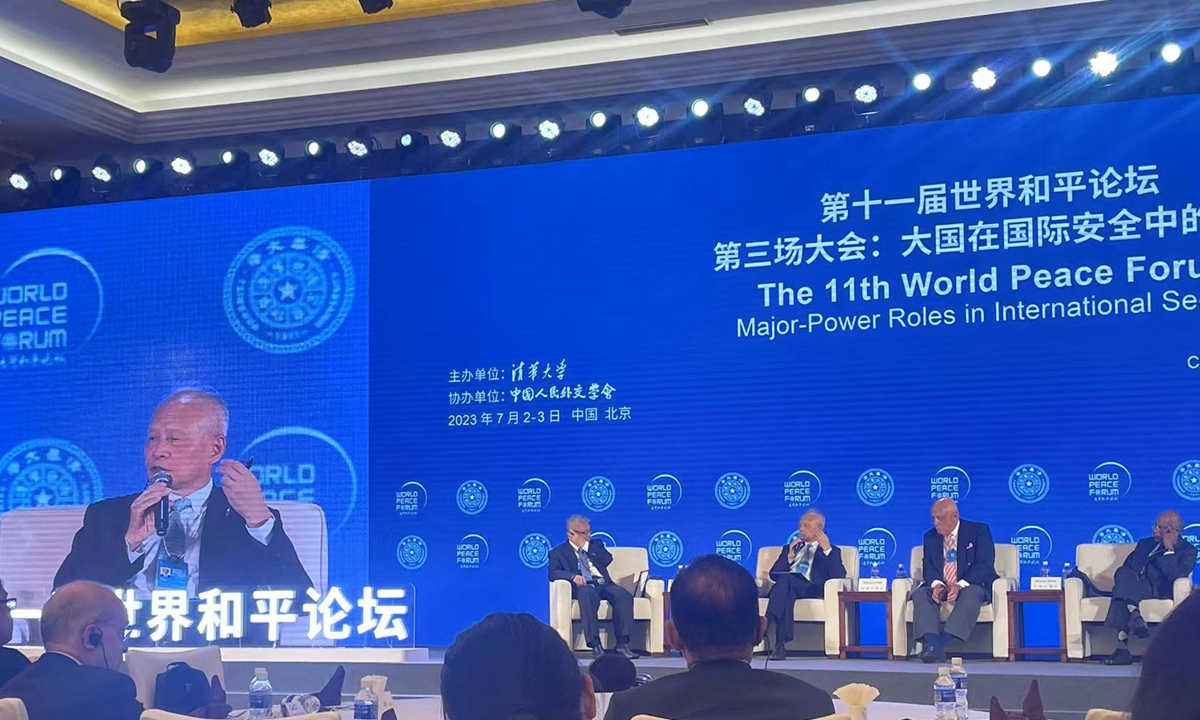
Former Chinese Ambassador to the US Cui Tiankai speaks at the 11th World Peace Forum in Beijing. Photo: Chen Qingqing/GT
If the bilateral relationship is already on the wrong track, what use are "guardrails"? Cui Tiankai, former Chinese ambassador to the US, remarked at the 11th World Peace Forum. He emphasized that it's necessary to ensure that the relationship is on the right path, only then can "guardrails" work, and this requires enough political will from both sides.
The remarks were made in response to Washington's calls for "setting up guardrails" for China-US relations.
Responding to recent comments by US Secretary of State Antony Blinken that "the US will continue to do things and say things China doesn't like," Cui stated that China never expected the US to say or do things to please China, and China has never promised to say or do things that the US likes.
The key is for both sides to find a true way to respect each other and peacefully coexist. "This is not about one side trying to make the other side like itself," Cui said.
Cui expressed hope that the future direction of China-US relations will be beneficial to both countries and to the world. To achieve this kind of relationship, both countries need to have a common political will, not a "win or lose" or "life-or-death" zero-sum mentality. Consensus on goals and paths is required to strive together.
In addressing a question about the future of China-US relations, saying, "Now my American colleagues often say that we need 'guardrails'. I have reservations about this. If the relationship is already on the wrong track, what use are these 'guardrails'? We first need to ensure that the relationship is on the right path, only then can 'guardrails' work." This requires enough political will and effort from both sides. "I hope we can make progress."
The former Chinese ambassador to the US agreed that China and the US can cooperate in many areas. He recalled that during his time in Washington, China and the US cooperated practically in addressing the Ebola crisis in Africa, and medical staff from both militaries cooperated on the ground in African countries. "Why can't this kind of cooperation be extended to other areas?"
Cui noted that when the Belt and Road Initiative was proposed and when the Asian Infrastructure Investment Bank was established, China approached the US in search of cooperation. "Unfortunately, the US did not accept [China's proposal for cooperation] at the time. If the US had accepted our proposal and we had worked on these things together, the situation might be very different now."
In addressing the recent "restart" of engagement between China and the US, Cui stated that recent high-level interactions between the two countries are a good thing. It's better to sit down and talk than not to meet or talk.
Cui also discussed the prospects for NATO and its intent to expand to the Asia-Pacific region at the forum. He stated that the Asia-Pacific region does not need NATO. "We do not welcome NATO's presence in the Asia-Pacific. If NATO tries to expand into the Asia-Pacific, it might well signify its decline."




